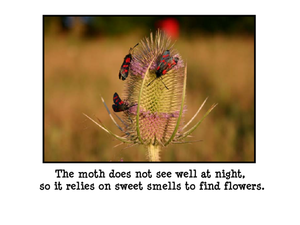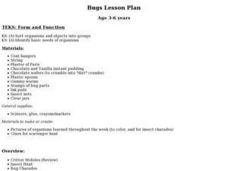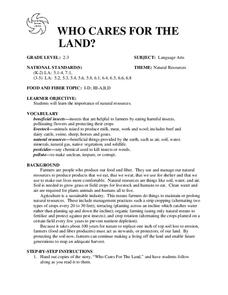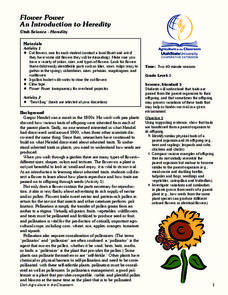Curated OER
COMMON KINDS OF INSECTS
Students will recognize and name three common insects.1. Share background information with students. 2. Provide students with the "bug body" puzzle pages, and have them cut the puzzles out.1. Share background information with students....
Curated OER
Design a Pollinator
Students make a scientific drawing of a pollinator with at least five traits that make them well adapted to a given plant(s). They describe in their science notebook the adaptations that make their pollinator well suited to a given plant.
Curated OER
Smarty Plants
Students examine plants and pollinators. In this plant biology lesson, students read The Power of Pollinators and identify the parts of the plant and the pollinators. Students design their own imaginary plants.
Curated OER
Bugs Lesson Plan
Students complete a unit of lessons on insects. They participate in a bug hunt, construct paper flowers, discuss pollination, create bug paperweights and insect mobiles, play bug charades, and participate in a bug scavenger hunt.
Curated OER
Plants 'n' Bugs
Second graders experiment to find if pollinators have color preferences. In this plant and bug lesson, 2nd graders gather information about how flowers pollinate. Students participate in a pollination experiment using the...
University of Wisconsin
A Rain Garden Year
Pupils become plants in an interpretive play that depicts what happens throughout the seasons in a rain garden. As you narrate, students bloom, flower, and go to seed accordingly. The lesson is first in a series of lessons written for...
Curated OER
Flower Power
Young scholars explore the parts of flowers and how they reproduce. They dissect flowers and observe the reproductive organs. Students observe anthers and ovaries of Tiger Lilies under a microscope. They investigate how insects and...
Agriculture in the Classroom
Pumpkins... Not Just For Halloween
Celebrate fall with four pumpkin themed hands-on activities! After learning about pumpkins, scholars complete two activity sheets that reinforce estimation and word problems. They then plant pumpkin seeds and bake a pie in...
Curated OER
Caterpillar Camouflage
Students list animals, plant parts, and reasons for caterpillars to camouflage themselves. In this animal and plant adaptations lesson plan, students also play a game where they use colors as camouflage.
Curated OER
Bugs in the Woods
Second graders identify insects and plants in the forest ecosystem in a structured field trip with stations and activity booklets. In this bugs lesson plan, 2nd graders explore the ecosystem of the forest, complete the booklet and...
Curated OER
In the Company of Wild Butterflies
Learners discover the life cycle of a butterfly and explain the different stages. In this exploratory lesson students watch a video and create insect art and they will get an opportunity to view live specimens of butterflies.
Cornell University
Weed IPM
Go on a weed hunt! Scholars gain insight into the characteristics of plants and examine the outdoor environment in order to identify five different types of weeds. Learners then show what they know with a one-page reflection.
Primary Resources
Science - The Parts of a Flower
Here is what a PowerPoint presentation should look like! This excellent show lets students know what they will be learning about, takes them through nicely-designed examples, leaves room for discussion questions, has a built-in activity,...
Curated OER
The Birds and the Bees, and the Flowers and the Trees
Students examine the roles in which animals play in the pollination of plants. They recognize that flowers have male and female sexes. Students describe cross pollination and propose reasons for cross pollination through narration of a...
Curated OER
Flower Power
Young scholars explore parts of the flower. In this plant biology lesson, students dissect flowers and identify how the seeds are formed. Young scholars take a nature walk to pick flowers for future dissections.
Curated OER
Web of Life - Role-Playing
Students role-play how organisms adapt to their environment. They play 20 questions with plant and animal habitats. They create a web of life to demonstrate how each plant and animal relies on the other for survival.
Curated OER
What Bees Eat
Young scholars study plant and animal interdependence by studying bees and pollination. In this interdependence lesson plan, students discuss flower parts and dissect it to show its reproductive parts. Young scholars then use tissue and...
Curated OER
WHAT'S ORGANIC?
Students explore how certain foods come to be certified "organic." They write the words "organic" and "synthetic" and given the definitions of each. Students are given dictionaries. They are asked: "What is organic food?" Students grow...
Curated OER
WHO CARES FOR THE LAND?
Students explore the importance of natural resources. They are given copies of the story, "Who Cares For The Land," and students follow
along as the teacher reads it. Students identify the key points in the story. (Soil, water and air...
Curated OER
Summer: Getting the Bugs Out
Students study biodiversity while examining insects. They research insects that already exist and how they adapt to their environment.
Curated OER
Flower Power: An Introduction to Heredity
Young scholars observe flowers and how they grow according to heredity. In this flowers lesson plan, students observe physical traits that make flowers the offspring of other flowers, and fill out worksheets according to their findings.
Curated OER
Pollen Collection And Identification
Students investigate plant reproduction, pollen collection and identification. They collect pollen samples over a twenty four hour period and examine them under a microscope.
Curated OER
Flower Structure and Reproduction
In this flower structure worksheet, students read the information on flower structure and reproduction. Students answer questions based on the reading provided.
Curated OER
Rainforest Complexity and Diversity
Second graders investigate the diversity of plants and animals in a rainforest. They watch an online story developed by the Rainforest Alliance, observe and record animals in their local area, explore various websites, and compare and...

























